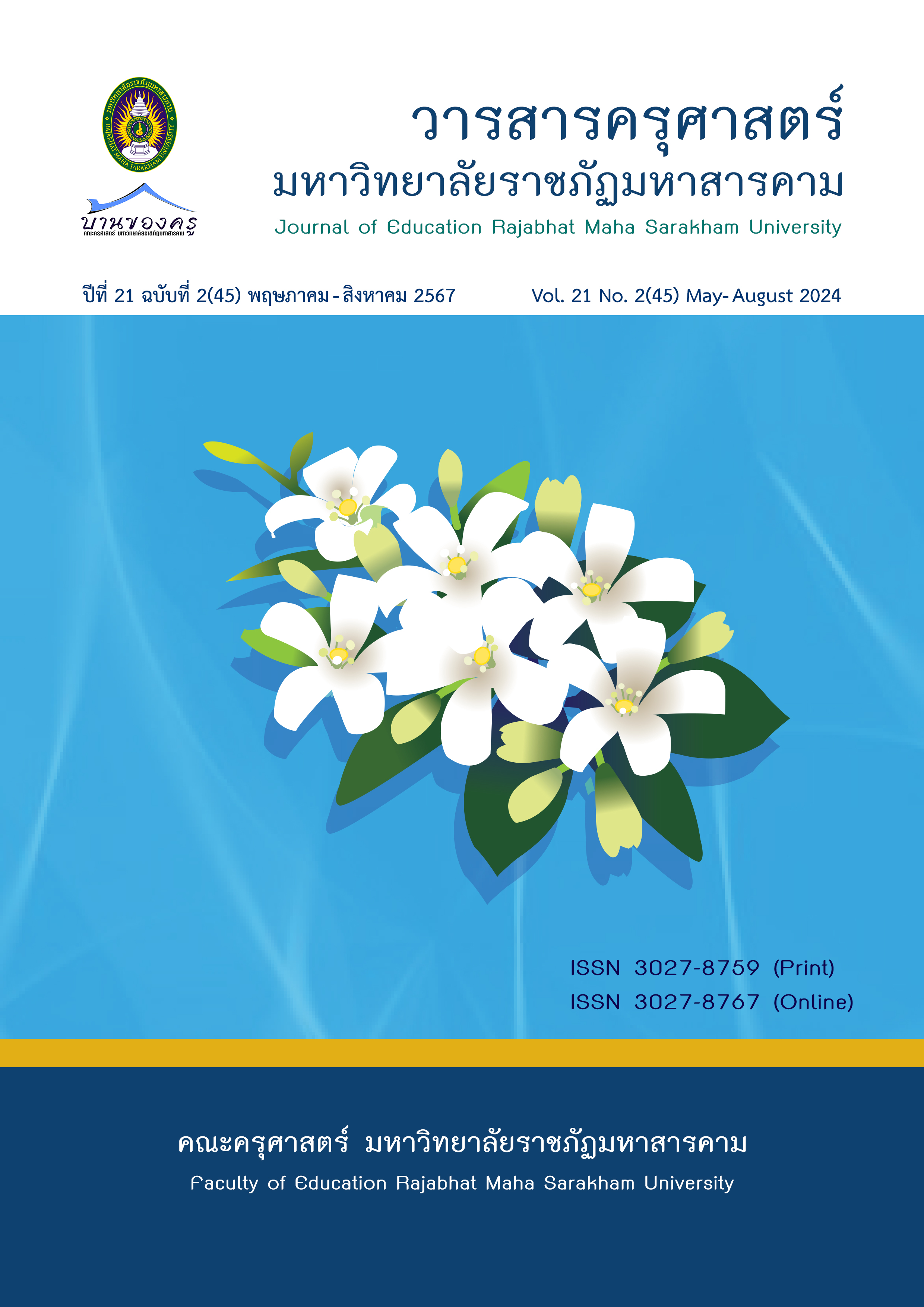The Role of Early Childhood Teachers in Nurturing Grit and Perseverance In Preschool Children
Main Article Content
Abstract
This article aims to provide teachers with knowledge, understanding, practical skills, and a positive perspective on fostering grit in preschool children (ages 3-6). It also presents examples of related research on grit as a guideline for teachers to adapt in child development. Grit is crucial for building a strong foundation for lifelong success as it demonstrates mental resilience, flexibility, problem-solving skills, self-confidence, a growth mindset, and discipline. These qualities form a robust foundation for academic success and quality of life in the future. Instilling grit in preschool children enables them to stand firm and strive against obstacles, being able to face challenges or failures and bounce back with resilience. Grit therefore essential and should be cultivated from an early age. The theoretical framework for fostering grit in preschool children includes the ecological systems theory of human development, cognitive development theory, and attachment theory. Teachers play a key role in building grit in preschool children through 1) creating a learning environment with diverse and challenging experiences, 2) building positive relationships, 3) using open-ended questions, 4) fostering a growth mindset, 5) encouraging children to face challenges, 6) assessment, 7) collaborating with parents, and 8) being a good role model.
Article Details

This work is licensed under a Creative Commons Attribution-NonCommercial-NoDerivatives 4.0 International License.
ข้อกำหนดเบื้องต้นที่ผู้นิพนธ์(ผู้ส่งบทความ) ควรทราบ
1. ผู้นิพนธ์ที่ประสงค์จะลงตีพิมพ์บทความกับวารสาร ตั้งแต่เดือนมกราคม 2563 เป็นต้นไป ให้ใช้รูปแบบใหม่ (Template 2563) โดยสามารถดูตัวอย่างได้ที่เมนู GUIDELINES
2. จะตีพิมพ์และเผยแพร่ได้ ต้องผ่านการประเมินจากผู้ทรงคุณวุฒิ (Peer Review)
3. การประเมินบทความโดยผู้ทรงคุณวุฒิ (Peer Review) เป็นแบบ Double Blind
4. การอ้างอิงบทความใช้หลักเกณฑ์ APA (American Psychological Association) คลิก
5. บทความถูกปฏิเสธการตีพิมพ์ ไม่ผ่านการประเมิน ผู้นิพนธ์ขอยกเลิกเองหรือชำระเงินก่อนได้รับการอนุมัติ ทางวารสารไม่มีนโยบายการคืนเงิน
References
ธีระเกียรติ เจริญเศรษฐศิลป์. (2566, 11 ธันวาคม). สมาร์ทโฟนทำโง่ ผลไม้พิษเด็กไทย. ไทยรัฐออนไลน์. https://www.thairath.co.th/news/politic/2746865
เบญจรัตน์ จงจำรัสพันธ์. (2559). ความสัมพันธ์ระหว่างความหวังและสุขภาวะองค์รวมโดยมีความเพียรและความเครียดเป็นตัวแปรกำกับ [วิทยานิพนธ์ปริญญามหาบัณฑิต]. จุฬาลงกรณ์มหาวิทยาลัย. DOI: http://doi.org/10.58837/CHULA.THE.2016.298
สำนักงานราชบัณฑิตยสภา. (5, พฤษภาคม, 2552). วิริยอุตสาหะ. http://legacy.orst.go.th/?knowledges
อภิชาติ จริยาวิลาศ. (2561, 21 สิงหาคม). จิตแพทย์ ไขคำตอบ คนยุคใหม่อดทนต่ำ เกิดจาก ปรากฏการณ์ทางสังคม. ไทยรัฐออนไลน์. https://www.thairath.co.th/news/local/bangkok/1359263
อภิพร เป็งปิง. (2562). ความเข้มแข็งทางจิตใจของเด็กในห้องเรียนอนุบาล. วารสารครุศาสตร์ จุฬาลงกรณ์มหาวิทยาลัย, 47(ฉบับเพิ่มเติม 2), 369-384.
Aguirre-Urreta, M. I., and Hu, J. (2019). Detecting common method bias. ACM SIGMIS Database 50, 45-70. doi: 10.1145/3330472.3330477
Bronfenbrenner, U. (1986). Ecology of the family as a context for human development: Research perspectives. Developmental Psychology, 22(6), 723-742.
Bowlby, J. (1980). Attachment and loss. Vol. 3: Loss: Sadness and depression. Basic Books.
Debora, R., & Pramono, R. (2021). Implementation of STEM learning method to develop children’s critical thinking and problem solving skills. Jurnal Obsesi: Jurnal Pendidikan Anak Usia Dini, 6(3), 1221-1232.
Duckworth, A. (2016). Grit: The power of perseverance and passion. NY: Scribner.
Duckworth, A., & Gross, J. J. (2014). Self-control and grit: Related but separable determinants of success. Current Directions in Psychological Science, 23, 319-325. .
Dweck, C. S. (2016). Mindset: The new psychology of success (2nd ed.). Random House.
Early, D. M., Maxwell, K. L., Ponder, B. D., & Pan, Y. (2017). Improving teacher-child interactions: A randomized controlled trial of Making the Most of Classroom Interactions and My Teaching Partner professional development models. Early childhood research quarterly, 38, 57-70.
Frederick Scholl. (August 01, 2021). Improve your grit score. https://www.qu.edu/quinnipiac-today/improve-your-grit-score-2021-08-01/
Haenilah, E. Y., Yanzi, H., & Drupadi, R. (2021). The Effect of the Scientific Approach-Based Learning on Problem Solving Skills in Early Childhood: Preliminary Study. International Journal of Instruction, 14(2), 289-304.
Jeonga, H. (2020). Resilience and grit of preservice kindergarten and elementary school teachers. International Journal of Innovation, 13(4), 223-234.
Lodge, J. M., & Harrison, W. J. (2019). Focus: Attention science: The role of attention in learning in the digital age. The Yale journal of biology and medicine, 92(1), 21-28.
Major, S. O., Palos, A. C., Gaspar, M. F., & Santos, A. I. (2024). Do We Get What We Expect? A Qualitative Study of Preschool Teachers’ Experiences with the Incredible Years® Teacher Classroom Management Program. Children and Youth Services Review, 107782.
Piaget, J. (1977). The development of thought: Equilibration of cognitive structures. King Press.
Postigo, Á., Cuesta, M., García-Cueto, E., Menéndez-Aller, Á., González-Nuevo, C., & Muñiz, J. (2021). Grit assessment: Is one dimension enough?. Journal of Personality Assessment, 103(6), 786-796.
Ulvi, O., Karamehic-Muratovic, A., Baghbanzadeh, M., Bashir, A., Smith, J., & Haque, U. (2022). Social media use and mental health: A global analysis. Epidemiologia, 3(1), 11-25.
Sandberg, S., & Grant, A. (2019). Option B: Facing Adversity, Building Resilience, and Finding Joy. Knopf.
Stefan, C. A., Dănilă, I., & Cristescu, D. (2022). Classroom-wide school interventions for preschoolers’ social-emotional learning: a systematic review of evidence-based programs. Educational Psychology Review, 34(4), 2971-3010.
Stormont, M., Reinke, W., & Herman, K. (2011). Teachers’ knowledge of evidence-based interventions and available school resources for children with emotional and behavioral problems. Journal of Behavioral Education, 20, 138-147.
Suryana, D., Yulia, R., & Safrizal, S. (2021). Model of questioning skill teacher for developing critical thinking skill in early childhood education in West Sumatra, Indonesia. Journal of Educational Sciences: Theory & Practice, 2(2), 101-114.
Sutter, M., Untertrifaller, A., & Zoller, C. (2022). Grit increases strongly in early childhood and is related to parental background. Scientific Reports, 12(1), 3561.
Ulvi, O., Karamehic-Muratovic, A., Baghbanzadeh, M., Bashir, A., Smith, J., & Haque, U. (2022). Social media use and mental health: a global analysis. Epidemiologia, 3(1), 11-25.
Zhang, T., Park, D., Ungar, L. H., Tsukayama, E., Luo, L., & Duckworth, A. L. (2022). The development of grit and growth mindset in Chinese children. Journal of Experimental Child Psychology, 221, 105450.


